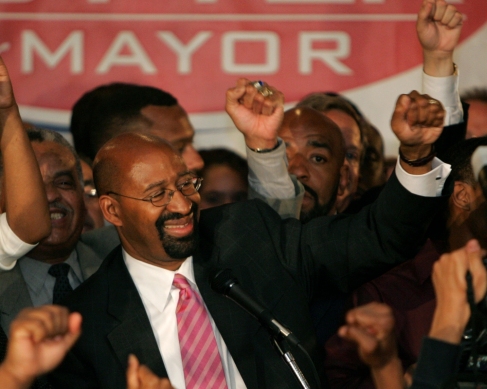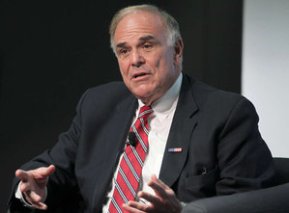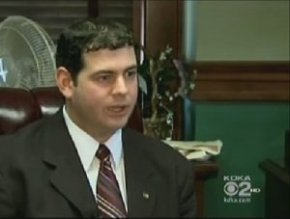Archive for the ‘Uncategorized’ Category
WASHINGTON — The two most popular guys at the Hyatt Regency ballroom on Capitol Hill on Thursday were Mayor Nutter and the New York York City health commissioner, and both were beloved for precisely the reasons that they have endured ridicule across the nation: taking on Big Soda.
“I’m in love with Mayor Nutter,” said Kirsten Aird, a public health educator, whose excitement at hearing an elected official “so eloquently” describe the challenges of obesity and smoking moved her to spontaneously call her boss in Portland, Ore.
This was the National Soda Summit, a 1½-day gathering of 250 public health workers and researchers who wanted to hear the latest science about the effects of sugary drinks on the body and the latest thinking about how to convince a skeptical public that they can be harmful.
New York Mayor Michael Bloomberg’s highly controversial proposal last week to ban the sale of sugar-sweetened beverages larger than 16 ounces at restaurants, stadiums, delis, and food carts had energized the crowd. Bloomberg wasn’t there. His health commissioner, Thomas Farley, who has been pilloried for the idea, was warmly received.
But Nutter’s keynote address brought a standing ovation. He said the concept of limiting supersize drinks was “a very bold strategy” that was “worth all of us evaluating and considering.” In an interview, he said he had asked the Health Department to review it but had not formed an opinion, and did not even know if he had the authority to do something similar.
In the end, it was Nutter’s descriptions of a sincere, long-term commitment to controversial public health measures that turned on the crowd. He said that the city’s antismoking regulations were the most important accomplishment of his 15 years on City Council, that the city’s menu-labeling law is the strongest in the nation, and that his twice-unsuccessful fight to impose a 2-cent-per-ounce tax on sugary drinks was worth the fight.
He also acknowledged that a counterargument from the sugar-drink industry carries some weight in the debate. The science showing that sugary drinks are a health hazard, while compelling, has yet to prove cause and effect on a large scale.
“That’s why I am calling for the same kind of report on sugar-sweetened beverages as the surgeon general” researched and issued on tobacco in 1964, he said.
A few hours later, Sen. Frank Lautenberg (D., N.J.) announced that he had introduced an amendment to the farm bill requiring the federal government to study a possible link between sugary beverages and obesity. His office said the idea had been around for a while and was introduced Thursday when the farm bill was taken up by the Senate.
The beverage industry says that taxing or banning sugar-sweetened beverages would have little effect on health because people ingest sugar from a range of snacks and other foods. It also says that Americans should be allowed to drink what they want.
Both arguments have resonated with much of the public, and “nanny state” worries have dominated editorial pages, social media, and sidewalk conversations.
Thursday’s conference was sponsored by the Center for Science in the Public Interest, a consumer research and advocacy group that has been a key player in pressing for nutrition regulations and a longtime critic of the beverage industry. Several scientists who spoke have taken stands in support of limiting sugar.
Farley put up an image that he said was from the Coca-Cola museum showing a vintage ad for a bottle of soda. “Serves 3 people,” the ad reads, “big 16-ounce size.” That is the size cup that New York is hoping to make the maximum.
Kelly Brownell, director of Yale University’s Rudd Center for Food Policy and Obesity, predicted that public opinion would turn against the industry in the next five to 10 years, much as it did with tobacco a generation ago, partly as evidence accumulates that certain foods are addictive.
The evidence against sugar “is very strong,” said Brownell.
Perhaps the most compelling speaker was neither a scientist nor a public health official but a marketing expert who said he had nothing against soda, although he believed the soda industry had become too powerful.
Todd Putnam, a former vice president of innovation for the Coca-Cola brand, said the soft-drink industry spent $11 billion advertising sugar-sweetened beverages in 2011 — a sharp increase from the past — and had it down to a science that astounded many in the room, including him.
The overriding goal for a soda executive: “Get more ounces per day into more people,” said Putnam, who runs a consulting firm that works with health/wellness brands.
To accomplish that, he said, beverage companies had a unique strategy: “Increase share of stomach.”
POLITICIANS cashing in as soon as they leave office may be the world’s second-oldest profession – and, arguably, it’s a job that nobody does better than Pennsylvanians.
Consider ex-governor and ex-Homeland Security chief Tom Ridge, who became a paid director of Home Depot a few years after his Department of Homeland Security urged Americans to stock up on duct tape.
Or Rick Santorum, ousted senator-turned-presidential candidate – a career politician who recently has earned as much as $1 million a year, some of it consulting for companies whose agendas he fought for in Congress.
But did Ed Rendell, the former governor who left office just l4 months ago, take it too far by taking big-time speaking fees and making multiple trips to Paris to advocate for an Iranian group that long ago called the United States “this satanic force threatening the world” and is still listed as a terrorist organization by the U.S. State Department?
An obscure arm of the U.S. Treasury Department is now looking into exactly that. Its Office of Foreign Assets Control recently subpoenaed records about Rendell’s speaking fees on behalf of the militant group, Mujahedeen-e-Khalq, or MEK.
Rendell is one of a large number of ex-pols and ex-generals who’ve been paid by MEK and have advocated for the group – which opposes Iran’s current rulers – to be removed from the terrorist list. But he’s believed to be the only one whose fees are under investigation.
“The governor isn’t going to comment, because it’s an ongoing legal issue,” his spokeswoman, Kirstin Snow, said yesterday. Over the weekend, Rendell left a lengthy voice mail with an Inquirer reporter in which he said that he felt “passionate” about the plight of the group, which says that its camp in neighboring Iraq has been attacked by the Iraqi government.
MEK dates back to the late 1960s, when it was a virulently anti-American, Marxist-Islamist group supporting an “armed struggle.” But it turned against Iran’s mullahs and was given shelter in Iraq – by its former dictator Saddam Hussein.
In 2001, MEK renounced violence and has not been linked to any attacks in recent years, although groups like Human Rights Watch still brand MEK as a kind of cult.
“They have somehow learned to exploit the twin weaknesses in the U.S. political system: the ignorance of the international affairs (in a world where all politics is local) and the ability to buy politicians with barely legal bribes in the form of ‘speaking fees,’ ” Ahmad Sadri, professor of Islamic-world studies at Lake Forest College in Illinois and a critic of MEK, wrote in an email to the Daily News yesterday.
According to a 2011 article in the Christian Science Monitor, Rendell was asked by MEK to speak last July and declined at first – “I don’t know hardly anything about this subject,” he told them – but then changed his mind.
The Philly Democrat told the newspaper that he had been paid $20,000 for a 10-minute speech in which he said he would urge President Obama and Secretary of State Hillary Clinton to guarantee the safety of MEK’s camp in Iraq.
He told the Inquirer that he was moved to back MEK in part because of its outspoken support from his GOP predecessor as governor, Ridge. It’s not clear how many among MEK’s legion of high-level supporters – not just Rendell and Ridge but former presidential hopefuls Howard Dean, Bill Richardson and Rudy Giuliani, and ex-U.N. Ambassador John Bolton – are paid for their efforts, and if so, how much.
There are other benefits for Rendell. He reportedly has been to Paris, MEK’s headquarters, four times and to Geneva twice – all on behalf of a group he knew little about eight months ago.
HARRISBURG (KDKA) — Two men are in custody after a local lawmaker, his chief of staff and his intern, a Slippery Rock University Student, were robbed at gunpoint.
It happened around 12:30 a.m. Monday near the State Capitol in Harrisburg.
“When they pointed the gun at my chief of staff’s head, told us to get down on the ground, we got down on the ground and they told us to clear our pockets,” State Rep. Jaret Gibbons, who represents Beaver, Butler, and Lawrence County said. “We gave them cell phones, wallets, etcetera.”
Neither Gibbons, his aide nor his intern, Charles Goodall, was seriously hurt.
It happened on Court Street as the trio was unloading belongings into an apartment. The gunmen took off in a car belonging to Gibbons’ aide, Kevin Bowser.
The vehicle was located a short time later. Police arrested the two men inside. Both are from Harrisburg and face numerous charges.
Police believe an argument led to a shooting at a Penn Hills house that left a mother and son dead early this morning.
Angela Proctor, 51, and her son, Manning, 22, were killed when at least one gunman burst into their apartment on Westwood Road at about 1 a.m. and opened fire.
A 19-year-old friend of Mr. Proctor’s, who stayed with him and his mother, was wounded.
County homicide detectives believe an argument between Mr. Proctor’s friend and visitors in another part of the rundown house preceded the shooting and that it appears the friend was the target. Police aren’t releasing his name and said they aren’t certain what the argument was about.
It wasn’t clear who was inside the ramshackle house when the shooting occurred, although neighbors said people came and went often.
Ms. Proctor had rented the home for the last 10 years or so and went to work every day at the University of Pittsburgh, said relatives who stopped by this afternoon but would not identify themselves. Manning Proctor was a college student, they said.
Ms. Proctor was pronounced dead at the scene. Mr. Proctor died shortly after 3 a.m. at UPMC Presbyterian.
The beginning. Sheed grew up down 13street projects / AKA SAIGON. So from the time he was little he always wanted to make a better way for him and his family. sheed fell in love with music from the first time he listen to it on his older brother boom box in 1989 sheed was just 4 years old and the rest is just history in the making. [The grind] Sheed been feature on a lot of local mixtapes power 99 fm come up show cosmic kev feat. One of sheed song for 6 week’s.. Sheed has won talent shows and has been on soundtracks for a lot of independent films.. Sheed is currently working on his album no competition ! set to drop in 2011 . Sheed is a Philadelphia native but spend mostly of his time down New Orleans his second home were he mostly does his music. Sheed is set to be the center stage for Philly with independent movies rap DVDs club Performance local music & TV and local radio station and a hole lot more www.southphillysheed.com
SOUTH PHILLY ANTHEM
THE BLOCK THE MOVIE preview
WHEN PHILADELPHIA public-school students today take state achievement tests administered by teachers they are unfamiliar with, it will be done “under a cloud of doubt,” one educator said yesterday.
“It’s a lot like if two of our students act up, but we give detention to the whole class,” said Alison Pironti, a fourth-grade teacher at Carnell Elementary School, in Oxford Circle, who specializes in teaching English to speakers of other languages.
It goes against a basic teaching tenet, Pironti said: Don’t punish everyone, and target the students that need the attention.
Or, in the case of the district, she said, focus on the schools under investigation by the state for allegedly cheating on the tests and bypass the schools that are not suspected of cheating.
The state Department of Education believes otherwise. It ordered the city’s public-school teachers to be blocked from administering the Pennsylvania System of School Assessment tests to their own students.
Teachers will also be required to sign forms acknowledging that if any wrongdoing is found, criminal penalties will be pursued, according to a report published yesterday in the Inquirer.
The state measure sends out a “blanket statement that there’s something wrong with all Philadelphia schools,” Pironti said. “It’s putting us all under a cloud of doubt.”
The state is investigating 53 district schools, including 11 out of the 25 schools that the district has praised as high-achieving “vanguard” schools, according to the Inquirer. Three charters – Philadelphia Electrical and Technology, Imhotep and Walter Palmer Leadership Learning Partners – are also under state investigation, the paper reported.
Teachers interviewed yesterday were most concerned that the new faces in the classroom during the test would add stress for students who are already under pressure to perform well.
“As much as a 10-year-old can, they understand” that they will have different teachers during the tests, said Stephanie Taggart, a fourth-grade teacher at Thomas Creighton School, in Crescentville.
“It would be reassuring to them to have me in the room,” Taggart said. “They are very used to me. I’d like to be there for them.”
Many teachers say the message that the state mandate sends out is loud and clear.
“It says that we don’t trust you,” said Matthew Mandel, a National Board Certified Teacher who instructs eighth-graders at CCA Baldi Middle School, in Northeast Philadelphia.
“Teachers have really not been treated with the respect afforded other professions,” he said. “This is kind of consistent.”
Still, Mandell agrees with the state-imposed procedure.
“It’s unfortunate, because the overwhelming majority of teachers and school personnel are aboveboard, but are still under a cloud of suspicion,” he said. “We should welcome efforts to remove that doubt.”
* Columbus Boulevard near Christian Street
Police yesterday identified the man killed early Saturday morning in a double shooting on Columbus Boulevard near Christian Street as Adolf Bradford, 25, of Edgewater Park, N.J.
Bradford was the passenger inside an Infiniti headed northbound on Columbus when shots rang out just before 4 a.m., leaving him dead in the front seat and sending the driver, an unidentified man in his 20s, to the hospital with a gunshot to the throat, police said.
Police took the other victim to Thomas Jefferson University Hospital, where he was listed in stable condition yesterday.
Investigators said that they had no witnesses to the shooting, but that two friends of the victims who’d been traveling in another car on Columbus Boulevard, as well as three men who stopped to help, had been interviewed by homicide detectives.
Police said they believe the gunfire likely came from another car on the divided highway, but they did not have a description of that vehicle or any suspects.
Victims in double homicide ID’d
* 17th Street near Susquehanna Avenue, North Philadelphia
Police have identified the victims of a double homicide Saturday in North Philadelphia as Robert Alvin, 39, and Michael Butler, 46.
Alvin and Butler, whose addresses were not released, were on 17th Street near Susquehanna Avenue when they were both shot multiple times by an unknown gunman at 1:16 a.m., police said. Both were pronounced dead at the scene.
Man, 31, kills girlfriend, self
* Rising Sun Avenue near Howell Street, Crescentville
A man took his girlfriend’s life, then his own, at a baseball field Saturday evening, according to police.
The 31-year-old man shot his 28-year-old girlfriend once in the upper torso at the Lawncrest Recreation Center baseball field, on Rising Sun Avenue near Howell Street, about 6:45 p.m., according to police, who did not identify the individuals.
He then put the gun to his chin and shot himself once in the head. Both were pronounced dead at the scene at 6:55 p.m., police said.
Man shot dead
in Kensington
* Kensington Avenue near Tioga Street
A 25-year-old man was shot to death in Kensington early yesterday.
The man, whose identity was not released, was shot twice in each leg while he was on Kensington Avenue near Tioga Street at 6:07 a.m. He was taken to Temple University Hospital, where he was pronounced dead at 7:07 a.m.

WASHINGTON – The Senate on Thursday defeated a GOP effort to roll back President Barack Obama’s policy on contraception insurance coverage in the first vote on an issue that raised questions of religious and women’s rights and riled Americans in this volatile election year.
The 51-48 vote killed an amendment that would have allowed employers and insurers to opt out of portions of the president’s health care law they found morally objectionable. That would have included the law’s requirement that insurers cover the costs of birth control. Democrats said the measure would have allowed employers and insurers to opt out of virtually any medical treatment with the mere mention of a moral or religious objection.
“We have never had a conscience clause for insurance companies,” said Sen. Barbara Boxer, D-Calif. The measure would have given insurers more opportunites to deny coverage for certain treatments, she added. “A lot of them don’t have any consciences. They’ll take it,” Boxer said.
Republicans argued that the law needs to be reversed because it violates the First Amendment’s guarantee of religious freedom by forcing insurers and employers to pay for contraception even if their faith forbids its use. Democrats said the amendment, sponsored by Sen. Roy Blunt, R-Mo, was an assault on women’s rights and could be used to cancel virtually any part of the law.
Both parties were using the issue to rally their bases; Republicans sought to hold together conservatives and others in the midst of an unsettled battle for the presidential nomination. And for Obama, there is no constituency more crucial to his re-election chances than women.
In the end, the vote hung on a handful of centrists as Democrats chose a parliamentary maneuver that required only 50 votes to kill the amendment. Its fate rested on a handful of centrists, but only three Democrats and one Republican defied their parties.
Voting with Republicans in favor of the amendment were Sens. Joe Manchin of West Virginia and Bob Casey of Pennsylvania, both up for re-election, and Ben Nelson of Nebraska, who is retiring. Sen. Olympia Snowe, R-Maine, who only this week abandoned her re-election bid out of frustration with the polarized Congress, was the lone Republican to vote to defeat the amendment.
Another Republican centrist, Susan Collins of Maine, kept all sides on edge until minutes before the vote. On the Senate floor, Collins said she was troubled that the administration could not assure her that faith-based self-insured organizations would be protected from the mandate to cover contraception.
“I feel that I have to vote for Sen. Blunt’s amendment,” she said.
Both sides protested strenuously that an issue affecting millions of Americans was being used for political gain, but the debate was steeped in election-year strategy. The presidency and the congressional majorities are at stake, and Obama’s contraception coverage policy is one of several cultural issues that have become prominent in the nation’s political discourse this year.
On the presidential campaign trail, GOP frontrunner Mitt Romney apparently stumbled over a question of whether he supports the amendment, in the end saying that he does support it, “of course.” His main challenger, former Pennsylvania Sen. Rick Santorum, has said that contraception conflicts with this Roman Catholic beliefs.
Blunt, Romney’s liaison to Congress, predicted the issue won’t go away.
“Unfortunately, this is only a glimpse of what Americans can expect as a result of President Obama’s government health care takeover – which is why we need to repeal and replace this bill with common-sense bipartisan solutions,” he said in a statement. “This fight is not over .
The Obama administration and congressional Democrats said Blunt’s measure was so broad it could allow employers to opt out of virtually any kind of medical treatment.
“This proposal isn’t limited to contraception nor is it limited to any preventive service. Any employer could restrict access to any service they say they object to,” said Secretary of Health and Human Resources Kathleen Sebelius. “The Obama administration believes that decisions about medical care should be made by a woman and her doctor, not a woman and her boss.
A majority of Americans support the use of contraceptives. The public is generally in favor of requiring birth control coverage for employees of religiously affiliated employers, according to a CBS News/New York Times poll Feb. 8-13. The survey found that 61 percent favor the mandate, while 31 percent oppose it. Even Catholics, whose church strongly opposed the recent government mandate, support the requirement at about the same rate as all Americans
WASHINGTON – The Senate on Thursday defeated a GOP effort to roll back President Barack Obama’s policy on contraception insurance coverage in the first vote on an issue that raised questions of religious and women’s rights and riled Americans in this volatile election year.
The 51-48 vote killed an amendment that would have allowed employers and insurers to opt out of portions of the president’s health care law they found morally objectionable. That would have included the law’s requirement that insurers cover the costs of birth control. Democrats said the measure would have allowed employers and insurers to opt out of virtually any medical treatment with the mere mention of a moral or religious objection.
“We have never had a conscience clause for insurance companies,” said Sen. Barbara Boxer, D-Calif. The measure would have given insurers more opportunites to deny coverage for certain treatments, she added. “A lot of them don’t have any consciences. They’ll take it,” Boxer said.
Republicans argued that the law needs to be reversed because it violates the First Amendment’s guarantee of religious freedom by forcing insurers and employers to pay for contraception even if their faith forbids its use. Democrats said the amendment, sponsored by Sen. Roy Blunt, R-Mo, was an assault on women’s rights and could be used to cancel virtually any part of the law.
Both parties were using the issue to rally their bases; Republicans sought to hold together conservatives and others in the midst of an unsettled battle for the presidential nomination. And for Obama, there is no constituency more crucial to his re-election chances than women.
In the end, the vote hung on a handful of centrists as Democrats chose a parliamentary maneuver that required only 50 votes to kill the amendment. Its fate rested on a handful of centrists, but only three Democrats and one Republican defied their parties.
Voting with Republicans in favor of the amendment were Sens. Joe Manchin of West Virginia and Bob Casey of Pennsylvania, both up for re-election, and Ben Nelson of Nebraska, who is retiring. Sen. Olympia Snowe, R-Maine, who only this week abandoned her re-election bid out of frustration with the polarized Congress, was the lone Republican to vote to defeat the amendment.
Another Republican centrist, Susan Collins of Maine, kept all sides on edge until minutes before the vote. On the Senate floor, Collins said she was troubled that the administration could not assure her that faith-based self-insured organizations would be protected from the mandate to cover contraception.
“I feel that I have to vote for Sen. Blunt’s amendment,” she said.
Both sides protested strenuously that an issue affecting millions of Americans was being used for political gain, but the debate was steeped in election-year strategy. The presidency and the congressional majorities are at stake, and Obama’s contraception coverage policy is one of several cultural issues that have become prominent in the nation’s political discourse this year.
On the presidential campaign trail, GOP frontrunner Mitt Romney apparently stumbled over a question of whether he supports the amendment, in the end saying that he does support it, “of course.” His main challenger, former Pennsylvania Sen. Rick Santorum, has said that contraception conflicts with this Roman Catholic beliefs.
Blunt, Romney’s liaison to Congress, predicted the issue won’t go away.
“Unfortunately, this is only a glimpse of what Americans can expect as a result of President Obama’s government health care takeover – which is why we need to repeal and replace this bill with common-sense bipartisan solutions,” he said in a statement. “This fight is not over .
The Obama administration and congressional Democrats said Blunt’s measure was so broad it could allow employers to opt out of virtually any kind of medical treatment.
“This proposal isn’t limited to contraception nor is it limited to any preventive service. Any employer could restrict access to any service they say they object to,” said Secretary of Health and Human Resources Kathleen Sebelius. “The Obama administration believes that decisions about medical care should be made by a woman and her doctor, not a woman and her boss.
A majority of Americans support the use of contraceptives. The public is generally in favor of requiring birth control coverage for employees of religiously affiliated employers, according to a CBS News/New York Times poll Feb. 8-13. The survey found that 61 percent favor the mandate, while 31 percent oppose it. Even Catholics, whose church strongly opposed the recent government mandate, support the requirement at about the same rate as all Americans





